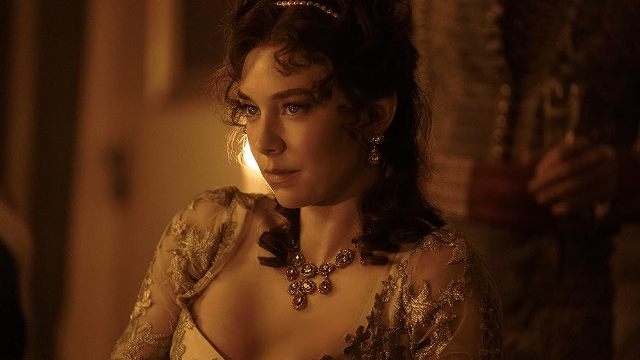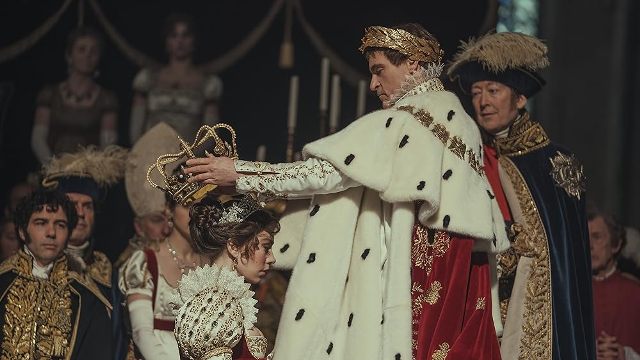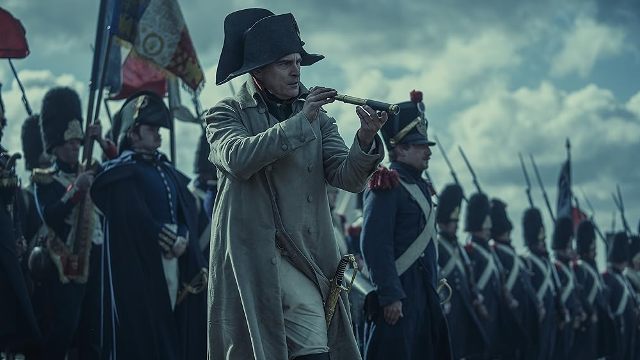“Napoleon” is an epic historical drama film directed and produced by Ridley Scott, with David Scarpa credited as the screenwriter. It’s a biographical work about the famous French leader and military commander Napoleon Bonaparte (Joaquin Phoenix), primarily depicting his rise to power and his relationship with his wife, Josephine (Vanessa Kirby). The film premiered in Paris on November 14th last year and after theatrical screenings arrived on the streaming service Apple TV+.
Napoleon was celebrated and studied in his time and after his death for his great military successes, but a good number of those campaigns probably wouldn’t have happened in stable circumstances and under the rule of “common sense”. The period in which Napoleon went from a scant revolutionary to a determined commander and powerful general to probably the most influential man of his era was neither stable nor “sane”.
There was a revolution in his homeland during which the ruling monarchy was violently overthrown and followed by the Reign of Terror that didn’t discriminate whose heads were put under the guillotine. A new government rose, after the architects of the revolution and the mass executions realized the irony too late. Pro-monarchy movements rebelled, and it became clear that the majority of people in France simply wanted order out of chaos, even if it meant putting an unstable man in power who could provide an illusion of order.

Joaquin Phoenix plays a man of seemingly unlimited power with the demeanor of a bored, irritable, and pathetic child. The first sight of Napoleon in the film is him looking on with a purely indifferent face amidst the riotous crowd witnessing the execution of Marie Antoinette. Politics, even with such violent ends, bore him, and now that this fight is over, he simply waits for the next one because then at least he’ll have something to do.
Isn’t that the way and path of most or all allegedly great leaders of history who in some way outgrow their power? Historians will probably continue to wonder whether Napoleon was a tyrant who invented wars that didn’t need to be fought or a strong ruler who simply reacted to what he saw as the best interest of his empire.
Napoleon is decisive and convincing in assessing people because he discards all pomp, all political debates, and even much of the reverence for Napoleon as the main strategist. It leaves him bare as a man with a deep flaw who would probably have died in some battle (since he was almost scared in the only battle he actively participated in), reached the peak of his influence in a military capacity, or lived a lonely and unloved life due to the perfect alignment of the fears and uncertainties of a country with his own.

This perspective makes Scott’s film a heightened, penetrating, and unexpectedly comedic character study, even as the director provides us with impressive action spectacle of battles with breathtaking scope and realistic scales. The story is filled with seemingly significant but ultimately meaningless battles in which tens or hundreds of thousands of people die bloody and brutal deaths, often just so Napoleon can say he deserves to be noticed, respected, and have some purpose in his life – he becomes the epitome of a petty tyrant.
That, of course, means that a lot happens in this story – from the chaos of the French Revolution and its aftermath, through the political intrigues of forming a new government with each leap forward in time, to scenes where the emperor makes enemies and forms, as well as breaks, alliances across Europe and Russia. It’s technically excellent because the characters are presented with minimal pomp (brief text on screen accompanies important historical figures) and uncertain purposes in the events themselves.
Besides intentionally murky politics because it was and still is, most of these characters are largely inconsequential to the story, except in how Napoleon perceives them. In other words, what could have been a confusing history lesson takes on a different focus and meaning simply because Scott and Scarpa are so firmly fixed on their main character. This whole character study is a constant irony – Napoleon is a man of such great ambition, military genius, and unchecked power, yet he’s nothing more than an insecure man in every element of his existence.
Napoleon’s own fixations include the desire to prove his worth, the need for love and affection he never got from his controlling and condemning mother, and the obsessive infatuation with “his” Josephine, a surviving member of the nobility. The tumultuous relationship of this couple is, in a way, the heart of this story, if only because it shows how such extensive desire of Napoleon’s can be so easily discarded when it conflicts with something more urgent and present – like the birth of an heir to make his rule seem more legitimate.
The only obvious exception, of course, is his intent for military strategy, which is quite clearly communicated in battle sequences. On the other hand, as brilliant as he can be, given his two major defeats in one massively fatal winter in Russia and on the famous terrain that would put an end to any future ambitions he might have had? The way he finally and casually shifts blame for any real or perceived failure from his side is insightful, a strong blow for this intimately focused epic.
A film about Napoleon promised on paper a dramatic and action spectacle. As for action, the film met my expectations, but it lacked dramatic tension and a sense of time flow. The likely reason for this is that few expected the center of drama (in a film full of historical events and different characters from different time periods) to revolve around a love story that is essentially dull. There are plans to release a director’s cut that will last over four hours, and I hope that what is missing in this commercial (butchered) version – sequences that won’t make Napoleon appear hurried, scattered, and disjointed, thus giving us more details.
Napoleon is a biographical film about the famous French leader and military commander whose loose symbiosis of action spectacle and epic drama falls far short of presenting a complete picture of its subject.
